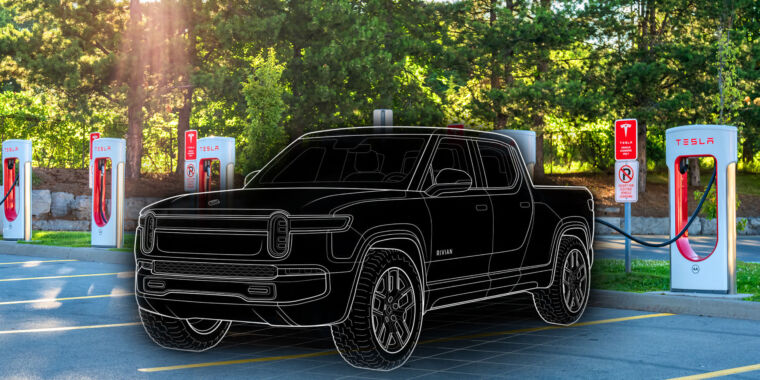This is upsetting since Tesla was going to adopt the CCS standard at their charging stations, since as far as I understand it, they were the only manufacturer with an unusual charging plug. Most everyone else was using CCS.
This announcement now means we’re farther away from a standard charging port, with Tesla, Ford, GM, and now Rivian adopting one set and others adopting another at the moment. I don’t care which one “wins” in the end or which is better, just pick one and be done with it.
Having one unified standard is definitely the best, but I think this move can be positive with just how prevalent Tesla Superchargers are in North America, not to mention their strong uptime. Before this shift, non-Tesla CCS owners had a common standard but not that many great working stations available.
I totally agree, and aside from my personal stance of not owning a Tesla, I can’t deny they’ve managed to nail it on the Supercharger front. I think my frustration is more that the one major holdout on a non-CCS standard was already planning to build CCS support into their network. If they’re going to keep on that path, great, but I also won’t trust Musk’s promises on something like this until it’s completed (especially if more manufacturers jump onboard to NACS).
Just seems like it would have been easier to drag one company one way vs. keeping it the wild west.
Yeah my only charging station in 30 miles is a Tesla charger. But I will not ever buy a car with their proprietary port. CCS is standard elsewhere and I refuse to give my money to Tesla even if it’s indirectly. If they changed ownership and actually put QC in their products one day I may reconsider though.
Tesla adding CCS as an option at superchargers would have been good, but unless they actually switched connectors on their cars it never would have led to long term consolidation. For better or worse, tesla has 3x the US market share of the rest of the EV manufacturers combined, so no solution could ever be a universal standard without their support. In practical terms, this move means that we’re closer to a universal standard than we’ve ever been, we’re going to have 95% of cars and a majority of charging infrastructure all use one plug. Once we get to that point, there’s no chance anyone else will use CCS, nobody else has the influence necessary to keep it alive
Yep, the less ‘standards’ the better!
I’d say it means that North America is finally moving to a single standard. All the other companies will get on board eventually. And the Tesla connector is better, so that’s just a bonus.
I’m a little irritated that the government didn’t step in and declare a standard before EV charging stations were built in the US. Charging stations are expensive, and they’re going to become increasingly important infrastructure. We want people to buy electric cars, but now the early adopters who didn’t buy a Tesla are being punished. This was NOT the time to adopt a “let the market decide” attitude.
While I am not against it, I am sorry to see that it appears we are creating a de-facto charging monopoly. If Tesla opened the standard for 3rd party stations I would be all on board.
For what it’s worth, all of the technical specifications are open and published by Tesla. I believe they a design patent, but that they’ve committed to open use of it as with their other patents.
On the upside, patents have an expiry date. Quite far from now, but if we make it to that, then we’ll just have ourselves a single common standard that everyone is free to use.
It just sucks in the meantime.
Been an interesting last couple weeks seeing automakers join the NACS party. Seems like slowly but surely they all will announce support at some point. Hoping Volvo/Polestar is next!
It’s this a good or bad thing?
I’d recommend watching Technology Connection’s take on it, as he was pretty outspoken against the Tesla plug a while back: https://www.youtube.com/watch?v=wjny4u5THpU
I just think of it like everything transitioning to USB-C. It’s not good or bad really, it just is. Standardization in these types of situations is usually good but I’m sure some people will be upset that Tesla is involved.
But is NACS open sourc? And license free? I am sceptic with Tesla having control over this. USB C is open standard.
Tesla has released all the specifications, so other charging manufacturers can include NACS cables on their charging stations. Several have already indicated an intent to do so.
What Tesla will charge for is access to their charger network, which is probably fair since it costs a lot of money to build and maintain the network.
I for one am very glad to hear this news because the supercharger network is Tesla’s one remaining big competitive advantage, and I’ll be glad to see all the other car companies more on equal footing with them.
Yes, Tesla made it open source last year:
At the same time everything that can run on 5v is transitioning to NOT supplying said 5v power converter. I guess we are all supposed to have built in usb power outlets in every room.
You are saying that like avoiding having a box of unused cables in every single household is a bad thing. Including an USB C cable with every device when the average household already has more than an handful of them is wasteful.
deleted by creator
As someone who isn’t sold on electric vehicles yet, this is a very good thing for me. Proprietary charging stations are one of my main reasons for not buying an EV yet.
It’s so wild to me that the USA is such a clusterfuck of charging ports and networks. Here in Germany, we have bascially CCS for fast charging and a smaller plug (that is compatible) for slow charging. So every car can charge on every station - with very few expectations. Charging my car is as simple as charging my phone.
well that’s mostly because the EU required that it become the standard. without similar regulation in the US it’s just taken a bit longer for all of the manufacturers to consolidate on one solution
Do Tesla cars in Europe have CCS or do they have to stick to only Tesla brand chargers?
CCS. I can charge my Opel (german car brand) on a Tesla charger, and I can charge a Tesla on any other charger.
I remember reading they were forced to go with CCS.
Yes, all Teslas in Europe have CCS
It is probably a good thing in that the industry is settling on one standard.
Hyundai said they were open to it as well but would defer to owner’s before deciding.
Having used both, while the market implications of NACS are still unclear it sure is the more ergonomic of the two standards. Those CCS2 DC connectors are just too large and unwieldy.










